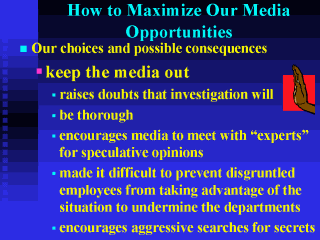| front |1 |2 |3 |4 |5 |6 |7 |8 |9 |10 |11 |12 |13 |14 |15 |16 |17 |18 |19 |20 |21 |22 |23 |24 |25 |26 |27 |28 |29 |30 |31 |32 |33 |34 |35 |36 |37 |38 |39 |40 |41 |42 |review |
 |
The worst thing that can be done is to imply, by complete restriction, that there is something to hide. When this is done media will seek outside experts who will not only speculate about what is or is not being done, but will also speculate about why restricted access is occurring. Disgruntled employees, usually within affected departments, make themselves available to media. Their goal is generally to call attention to their own plight. In doing so they may skew facts to support their perception that they are being treated unfairly. They may also imply that departments have a history of trying to withhold information or deceive. They will seek out the media and/or offer to be interviewed as media staff pursue their stories. In a Book TV interview on 11/2/02 the columnist George Will said that the media has an insatiable appetite for secrets and that there is virtually no possibility that any agency can withhold secrets from the “press”. |